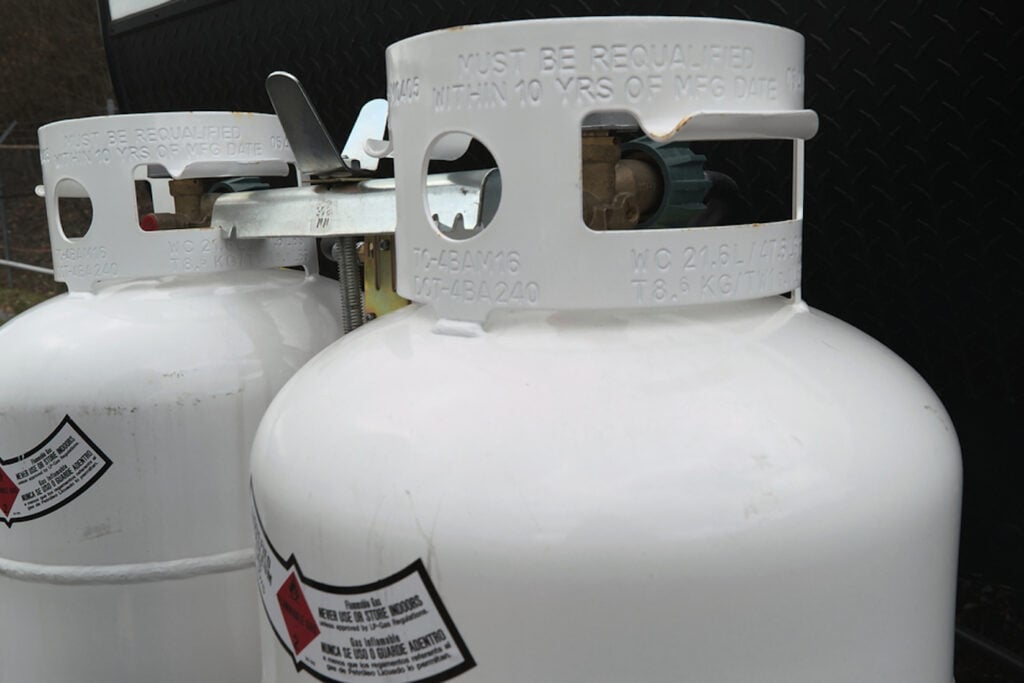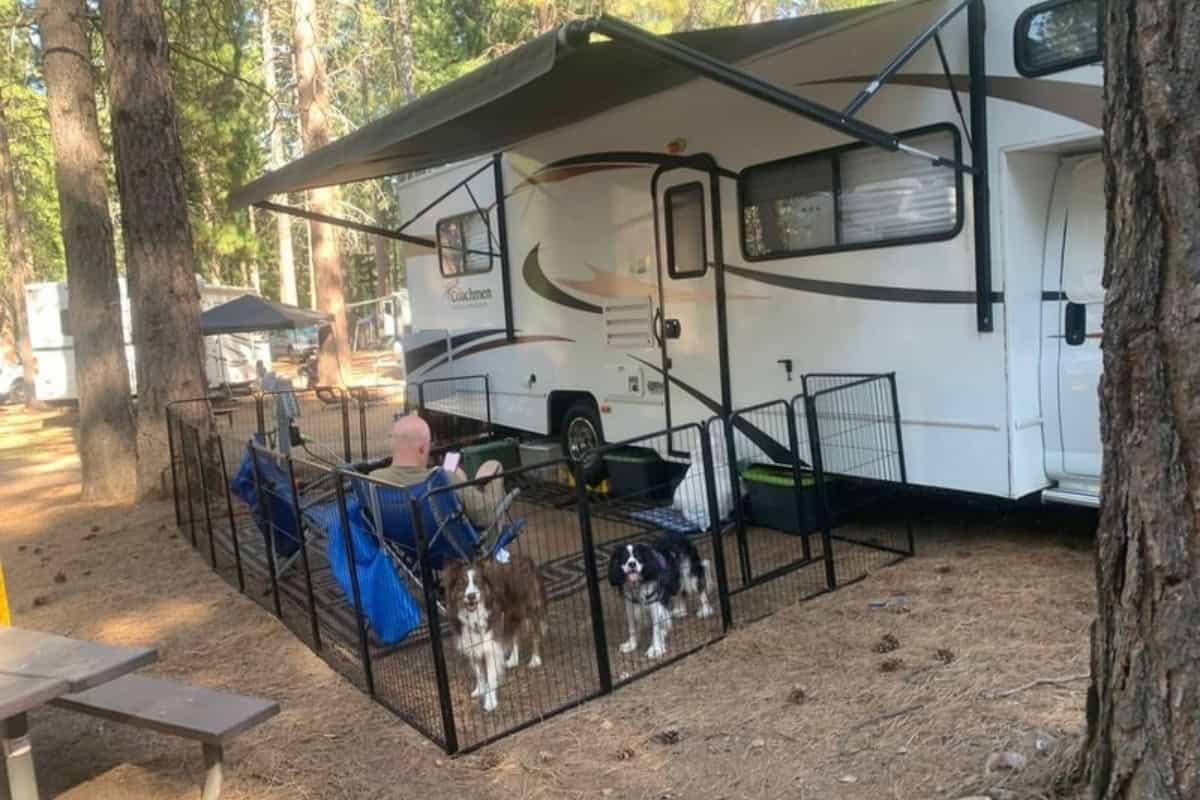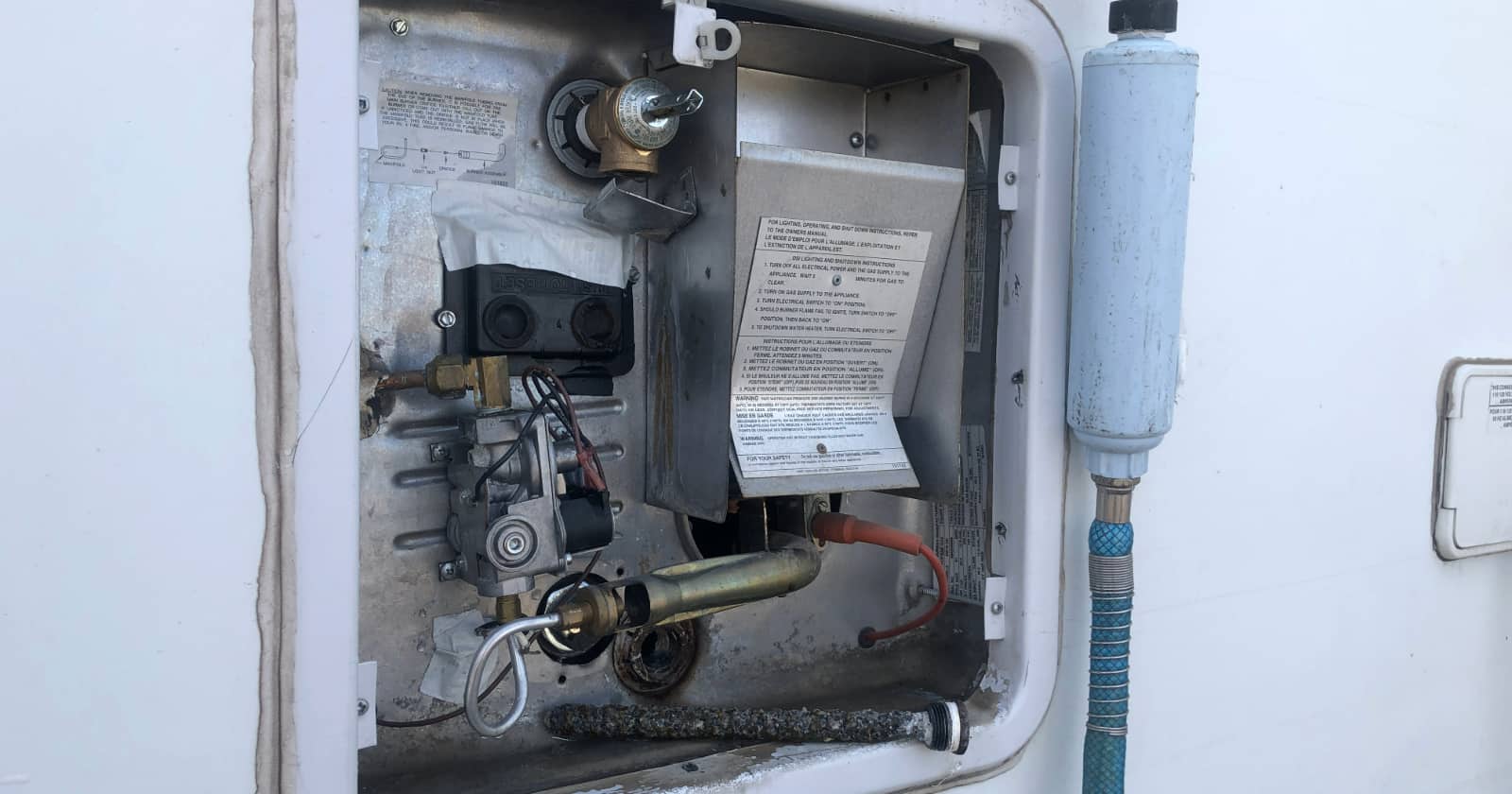
How Often Do You Need To Recertify Your RV Propane Tanks?
Nearly all RVs use propane for heating, cooking, or refrigeration. So, we tote propane around on our RVs in tanks. We usually empty and refill these tanks over and over again without even thinking about recertifying the tank. We don’t really pay much attention to our propane tanks (correctly called cylinders).
Really, unless a propane tank is showing obvious signs of age and distress (such as rust or leakage), it’s easy to overlook the fact that propane tanks need to be recertified from time to time. Well, that’s only partly true, because only the portable propane tanks need to be recertified.
That’s because portable propane tanks are made of steel that’s light enough to be easy to carry and transport. While cylinders made with thinner steel are easy to transport when we want to get them filled or take them camping, they have the drawback of being more prone to damage than the heavier, permanently mounted propane tanks used on Class A motorhomes.
DOT requirements
Because it can be a threat to health and safety, propane is considered a hazardous material. Considering that a propane leak from a rusted or damaged propane cylinder could create an extremely hazardous situation, transporting it in lightweight portable propane tanks (like the ones we use for RVing) is considered a risk to safety.
With that in mind, the Department of Transportation is pretty strict about making sure that propane is transported in these 15 lb, 20 lb, and 30 lb cylinders is transported as safely as possible. The DOT requires that all portable propane tanks be visually inspected before they can be filled. Not only that, but portable propane tanks have to be fully tested by an approved inspection facility and recertified every 10 years.
Do portable propane tanks need to be inspected?
In addition, the Department Of Transportation requires that all portable RV propane tanks be visually inspected before they can be filled. Here’s what the person filling your propane tank is legally compelled to look for in their visual inspection:
- Damage to the cylinder’s exterior including dents, bulges, cuts, or cracks on the cylinder’s surface,
or to welds, and any evidence of physical abuse, fire, or heat damage. - Detrimental rust, corrosion, or pitting on the cylinder, particularly on the bottom.
- Absence of/damage to a cylinder foot-ring, cylinder neck-ring (collar), or valve cover.
- A leaking or defective valve or leaking or defective pressure relief device.
How to tell when your RV propane tank needs to be recertified
Many RV owners are surprised to learn that propane tanks need to be recertified, even though they look like they’re in perfect condition. Well, if your tanks are 10 years old, they’ll need to be recertified, even if they look brand new.
Fortunately, it is easy to determine when your RV propane tanks need recertification. The Department of Transportation mandates that all portable propane tanks have their manufacturing date imprinted on the collar of the tank. DOT cylinders must be recertified 10 years after this date to ensure they remain safe for use. The bottom portion of the collar provides space for stamping the date of recertification.
Where to get RV propane tanks recertified
You can take your 10-year-old propane tank to a DOT-approved propane cylinder inspection facility to get it inspected. However, it’s often easier to simply trade it in at a propane exchange like Tank Traders.
Propane exchanges have inspectors who can recertify tanks after they do any necessary repairs. They get your old tank, and you get a shiny, newer tank full of propane. It’s a pretty neat system.
Stay on top of RV maintenance
Make sure you keep track of all your RV maintenance and repairs with an online tool such as RV LIFE Maintenance. Not only can you keep all of your documents in one place, but you’ll also receive timely reminders when maintenance is due to help you avoid costly repairs and potentially serious accidents.
Related articles:




I had a 20 lb. tank that had expired and the propane dealer where I went to get it refilled pointed it out and would not refill it. I went to a Blue Rhino dealer and exchanged it. Problem solved.
DOT cylinders must be recertified 10 years after this date to ensure they remain safe for use, But our local gasoline station does inspect the tanks or checks the date.
Our tanks are dated 2009 and the other one is 2010 both expired with no problem getting them refilled.
WHAT Department of Transportation is requiring this? Is this Federal or a specific state. Who are the propane tank police?
Be aware when pricing shopping a tank exchanging (for a a 20lb cylinder), vs a refill. Most tank exchange businesses only fill them with 15lbs of propane but they never make a point of telling you. They intend that you assume you’re getting 20 lbs, not 15lbs for about the same cost to refill with 20lbs.
Just to say in Canada (Manitoba) tanks have to be re-certified every 10 years. You don’t have a choice. Personally if your tank is in good shape, no dents,not rusted or leaking I don’t see the need. Come on, it’s sitting in a trailer compartment. I just went thru that and it pissed me off…
Also the cost of re-cert is more expensive than buying a new tank…You tell me, where is the logic…I’m just saying….
The DOT requires that all portable propane tanks be visually inspected before they can be filled, But the gasoline station that refills our 20lb portable propane tank does Not inspect or even lookat the tank or valve.
He just connects the filler hose and fills her up.
I know I should replace the tank cause it’s 2019 tank, but the story here is some gas stations do not inspect the tanks or look at dates they just fill the tank no matter if The DOT requires that all portable propane tanks be visually inspected before they can be filled.
Happy trails
Didn’t the timeframe for recertification change to 12 years, and then every 5 years thereafter?
It’s easier to just take your tank, every few years, by a place which will trade you for a full one, such as Blue Rhino. Then, you have a full tank and a newer one at the same time.